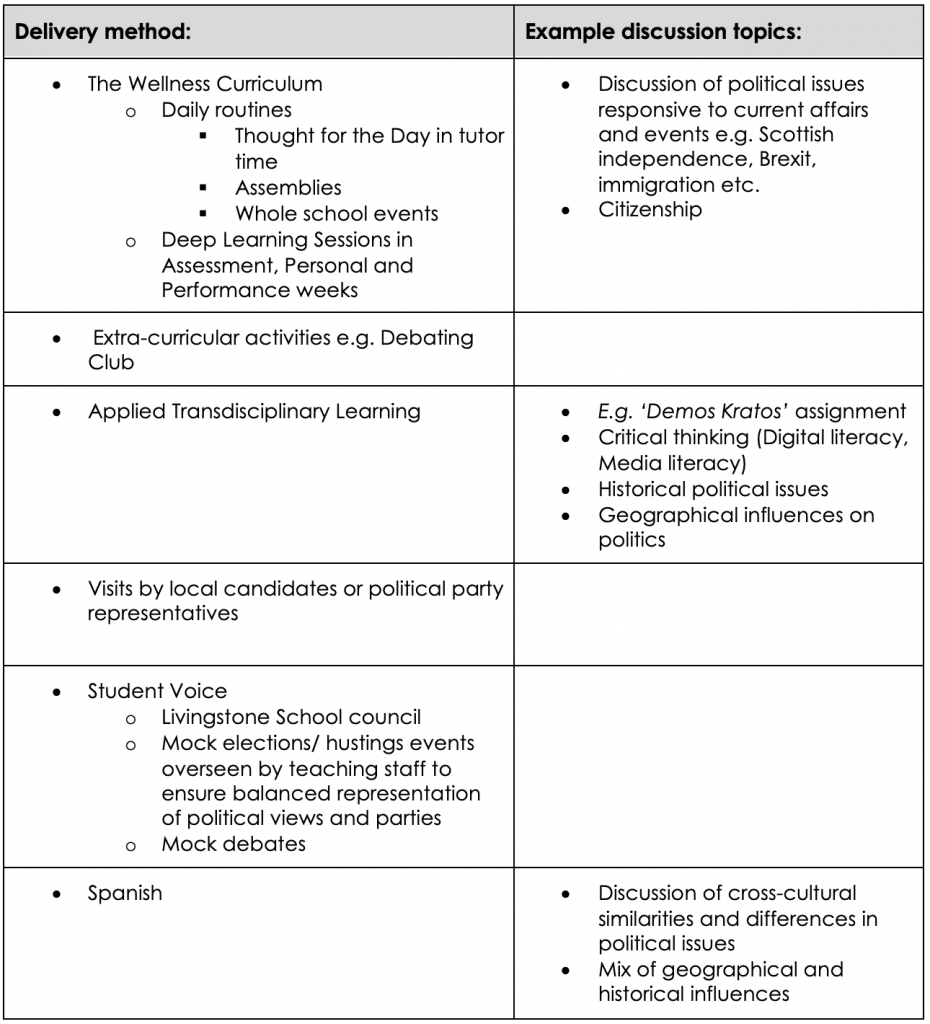Intent
The Academy aims to develop students into informed, active citizens who are able to participate and make positive contributions to communities to which they belong. A key aspect to active citizenship at all levels if having an appreciation and understanding of key political issues which impact society.
In all instances where political issues are covered within the school curriculum, we ensure that reasonable steps are taken by the Academy to offer students a balanced presentation of opposing views. We do not promote any political views in teaching.
We will regularly inform parents about the political issues due to be covered. The Executive Director of Learning will manage requests to withdraw students from non-statutory components of students’ political education. In the instance that parents wish to withdraw their child from the teaching of a particular political issue, provision for alternative teaching and learning activities will be made.
Implementation
The teaching of political issues at Livingstone focuses on giving young people the information, skills, experiences and mindset they need to help them develop as informed and active citizens in society.
Whilst we aim for students to leave the Academy equipped with the knowledge to make informed decisions on critical political issues, we are equally concerned with developing students’ critical thinking and digital and media skills. For students to participate and contribute positively to society, it is paramount that students are able to reflect critically on issues to which they are exposed, directly or indirectly. Students will also develop an awareness of how political issues in the past have shaped the political landscape of today.
To summarise, we educate our students about political issues through:
- British Values.
- Citizenship.
- Literacy (digital, media, cross-cultural).
- Historical political issues.
- Geographical influences on politics.
The elements in the table below show where political issues are taught across the school curriculum. We reserve the right to adapt and change the schedule in response to careful and thorough review of how the Academy can best support its students throughout the year. Further opportunities will be identified as the year progresses.

Early years foundation stage
In Early Years, students will be introduced to political issues through class activities which promote student voice and an awareness of current affairs. When talking to our students, we explain why it’s important to be kind, take turns and listen to what other people have to say. Talking about real-life situations that our students face every day is a springboard to political conversations. Every classroom has its set of rules to make sure everyone knows what they’re doing. Teaching opportunities involve watching the news or reading a newspaper with the class to kick-start discussions about what’s happening in the world. Our youngest students will learn about concepts like fairness, sharing and equality.
Activities may include, but are not limited to:
- Voting on activity choices or book choices.
- Voting and sharing their opinion on a range of topics and themes.
- Discussing the news and current affairs at a level suitable for EYFS.
Impact – Monitoring and Review
The delivery and education of political issues will be monitored and reviewed on a regular basis. This will be achieved by:
- All staff will engage with the continued development of the delivery of political issues at Livingstone Academy to ensure it is responsive to the contextual needs of the students, as well as current affairs.
- Staff will share classroom work and best practice at weekly staff meetings.
- The Executive Director of Learning will carry out monitoring on the teaching of political issues as part of the whole school monitoring process.

